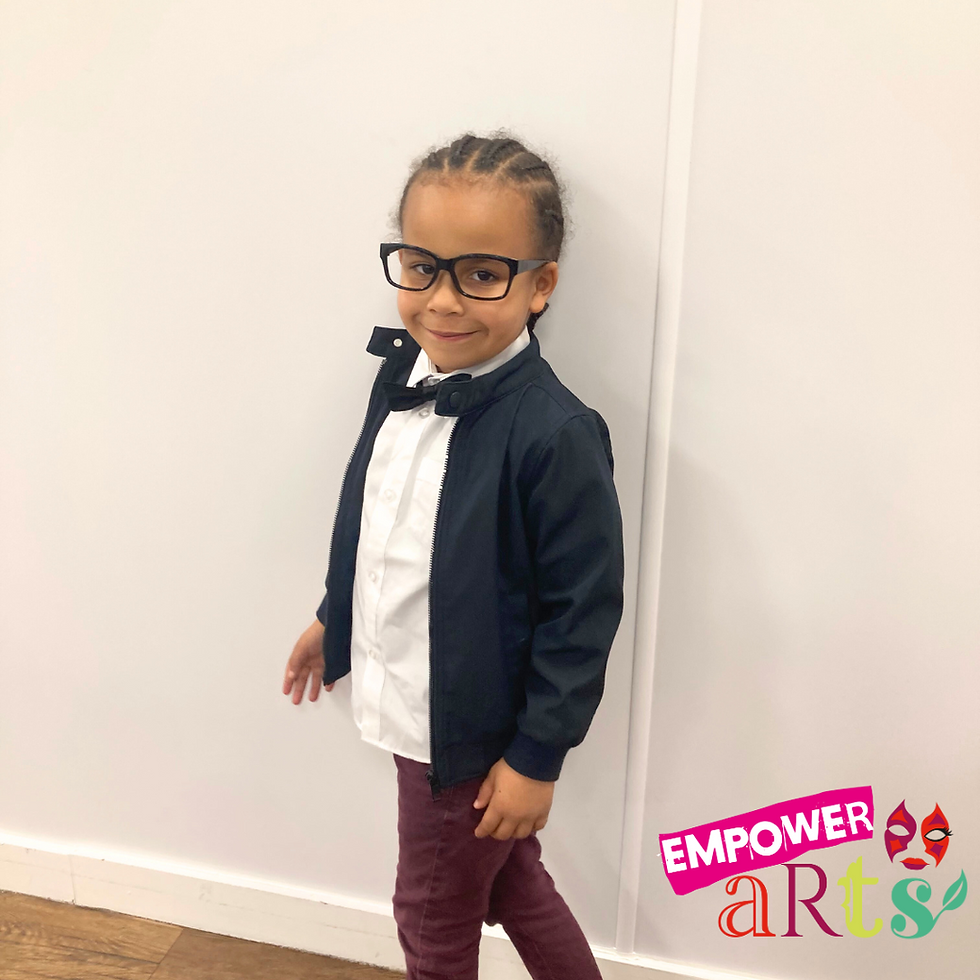Coping with Anxiety: Simple Drama Techniques for Children and Young People
- Taja Morgan
- Oct 11, 2024
- 3 min read
Updated: Apr 29, 2025

Anxiety can be overwhelming for children and teenagers, whether it’s triggered by school pressures, social situations, or personal challenges. At Empower Arts, we believe drama is a powerful tool for managing anxiety, helping children feel more in control of their emotions while building confidence.
Here are a few simple drama techniques that can help children and teens cope with anxiety, which you can try at home or in other settings.
1. Breathing Exercises to Calm the Mind
Controlled breathing is a simple yet effective way to manage anxiety. When children focus on their breath, they become more aware of their body, allowing them to calm their nerves and reduce feelings of stress.
Technique:
Deep Breathing: Have children sit comfortably, close their eyes, and breathe in slowly through their nose, counting to four. Ask them to hold their breath for a count of four and then exhale through their mouth for another count of four. Repeating this a few times can help reduce tension and increase feelings of relaxation.
This technique can be especially useful before high-pressure situations like exams, performances, or social interactions.
2. Role-Playing to Explore and Release Fears
Role-playing allows children to explore situations that might make them anxious in a safe, imaginative way. Acting out scenarios helps them see their worries from a different perspective and practice responses in a supportive environment.
Technique:
The "What If" Game: Create scenarios based on situations that children find stressful—such as starting a new school or speaking in front of others. Ask them to act out the scene, exploring "what if" situations (What if I forget my lines? What if someone laughs at me?). After acting it out, children can see that even if things don’t go perfectly, they can handle the situation and learn from it.
This exercise helps children process their fears and build resilience by exploring outcomes in a creative, pressure-free way.
3. Physical Movement to Release Tension
Anxiety can often lead to physical symptoms like fidgeting, restlessness, or muscle tension. Physical movement in drama classes is an excellent way for children to release that built-up energy.
Technique:
Shaking it Out: Children can stand in a circle and shake out different body parts—arms, legs, head, and so on—to release the tension in their muscles. This is a fun, playful way to let go of anxious energy and helps them feel more relaxed.
Freeze and Release: Another method is to ask children to tighten their entire body for a few seconds and then release all the tension. This exercise teaches them to recognise when their body is tense and how to actively relax.
4. Positive Affirmations and Visualisation
Positive affirmations and visualisation are great tools for helping children reframe anxious thoughts and develop a more positive outlook.
Technique:
Affirmation Circle: Encourage children to repeat positive affirmations like, “I am capable,” “I can handle challenges,” or “I am enough.” This simple practice builds self-esteem and helps them approach situations with more confidence.
Visualisation Exercise: You can also ask children to close their eyes and picture a calm, happy place, like a beach or a peaceful park. This mental “safe space” can help children feel more at ease when they are feeling anxious.
5. Storytelling to Externalise Anxiety
Storytelling is an effective way for children to externalise their anxiety, giving it a character or identity that they can interact with and manage.
Technique:
Creating the Anxiety Character: Encourage children to create a character that represents their anxiety. They can describe how the character looks, how it behaves, and what makes it appear. By externalising their anxiety, children can talk about it and find ways to deal with it without feeling overwhelmed.
This technique helps children separate themselves from their anxiety, making it easier to understand and control.
At Empower Arts, we’ve seen how drama can empower children and teenagers to manage their anxiety in creative and supportive ways. From breathing exercises to role-playing and positive affirmations, these simple techniques can make a significant difference in how young people approach stressful situations. With regular practice, children can develop the confidence and emotional resilience they need to thrive.
Other related posts you might enjoy:
Want to see how drama can help your child cope with anxiety? Join us for a taster session at Empower Arts, where we create a fun and supportive environment for children to express themselves, build confidence, and learn valuable coping skills. Contact us today to learn more about our drama classes for children and teens at info@empower-arts.co.uk or 07759092127 —we’d love to help your child feel more empowered!







Comments